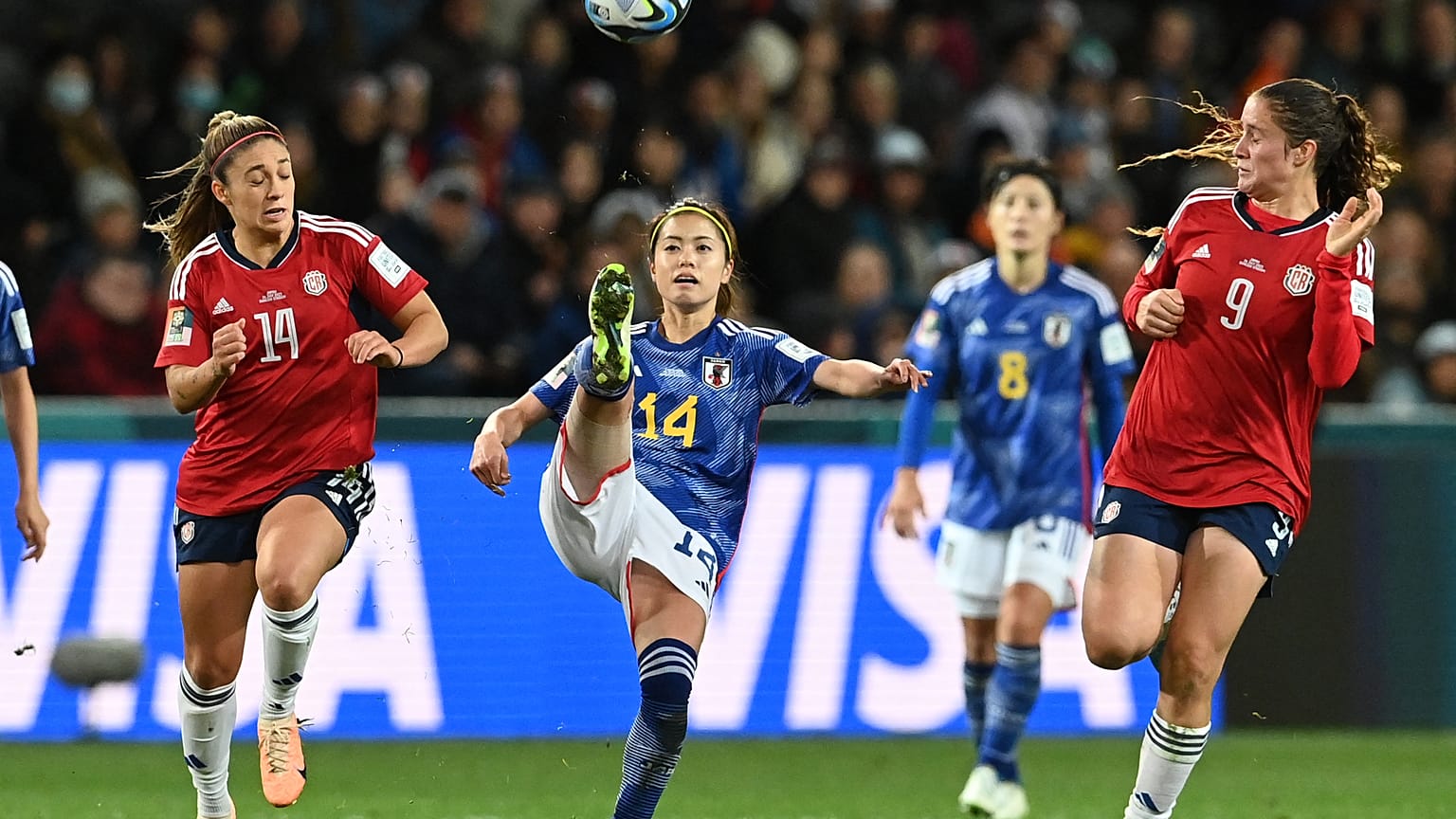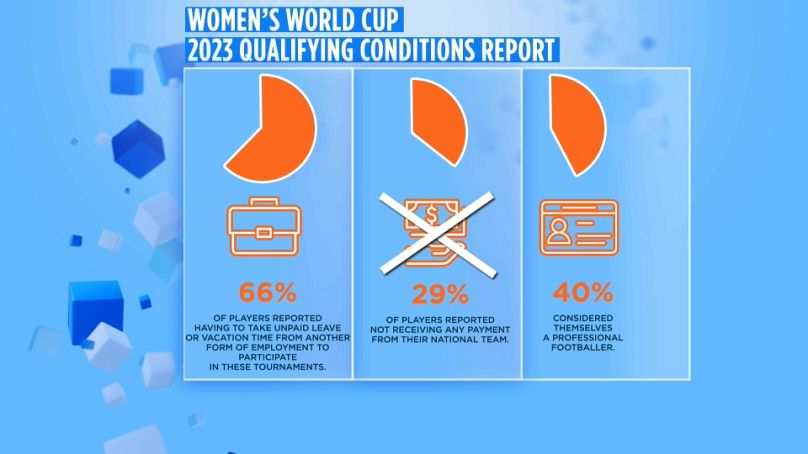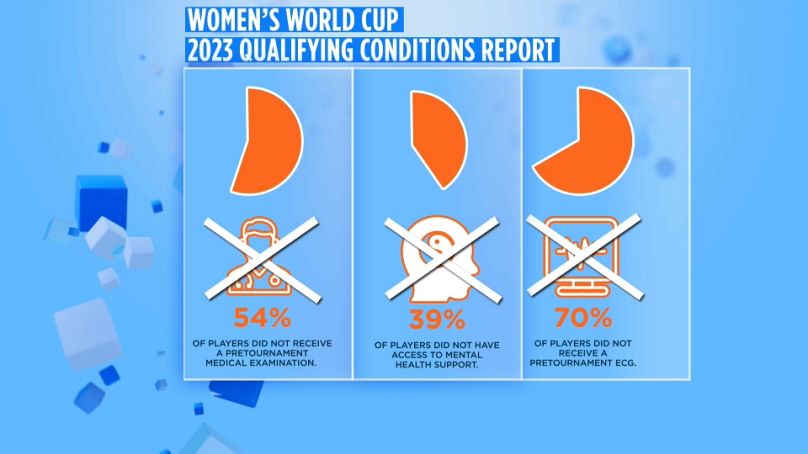Despite the progress made in women's sport, major challenges remain, particularly regarding equal pay, visibility and training conditions.
As the FIFA Women's World Cup kicked off last week, women's football finds itself at the centre of the world stage. Despite the progress made in women's sports, major challenges remain, particularly in terms of equal pay, visibility and training conditions.
 ADVERTISEMENT
ADVERTISEMENT
 ADVERTISEMENT
ADVERTISEMENT
"The European Commission is monitoring the situation closely" explains Ligia Nobrega, senior analyst at the European Institute for Gender Equality (EIGE). In 2018, the institute was commissioned by the Council of Europe to collect data on gender equality and sport in the EU Member States and check whether countries are applying the quota policy established in 2022.
According to this policy, by mid-2026, at least 40% of non-executive seats on boards of directors must be held by women, as well as at least 33% of executive and non-executive seats. This means female presidents, vice presidents, members and managers within the European sports confederations.
"We have tried to follow and monitor this initiative and we find that countries that have implemented quotas are achieving a more balanced representation of the sexes more quickly than countries that have not [...] And the best-performing countries are Finland, Sweden and the United Kingdom", explains the expert. "But we are still a long way from having 40% women represented in these organisations", she adds.
Equal pay: A match yet to be won
Despite considerable progress, equal pay remains a major challenge in women's sport. Unlike the United States women's national team – which, through its fight for parity, succeeded in obtaining a collective agreement guaranteeing equal pay for male and female players in the national team – many international federations continue not to offer fair pay to their female athletes.
Although some improvements have been made, women's salaries are still significantly lower than those of their male counterparts.
"We have huge pay inequalities. If I just tell you, for example, that the average salary of a female WNBA player was 110 times less than that of a male NBA colleague, that gives you an idea of the inequalities involved," comments Julian Jappert, director of the Think Tank Sport et Citoyenneté.
In a move aimed at closing the pay gap, FIFA has announced a 300% increase in bonuses for the 2023 Women's World Cup, bringing the total to €135 million. While this is a positive step, there is still a significant gap between the bonuses awarded to men and women at major tournaments. Indeed, at the last Men's World Cup 2022, FIFA allocated around – in performance bonuses to the federations of the participating teams.
According to a recent report by FIFPRO (the International Federation of Professional Footballers' Associations) on the qualifying conditions for players at the World Cup, of the players taking part in the 2023 World Cup, only 40% considered themselves to be professional footballers. While 35% said they were amateurs, 16% said they were semi-professionals and 9% were unsure of their status.
"Among the 362 players we interviewed from six continents around the world who had taken part in the 2023 World Cup qualifiers, there were huge disparities in their salaries," explains Alex Culvin, Head of Women's Football Strategy and Research at FIFPRO. "29% of players received no pay at all for this competition. This means that 66% had to take unpaid leave - or time off from their other professional activities - in order to take part in the World Cup qualifiers," she continues.
These figures are echoed by former French national team player Mélissa Plaza, who is now a sports psychologist: "For all the teams playing in the D1, we're talking about an average monthly salary of between €1,300 gross and €1,600 gross [...] When you're well below €1,300 gross a month, that means one thing, it means that you're not a professional, that you're not being paid exclusively to play football and that you need to have a job on the side," she explains.
Women's training: a field strewn with obstacles
According to Mélissa Plaza, training conditions for female football players are problematic and inadequate compared to the preparation of their male counterparts:
"We often pick up the scraps left over from the boys. All the equipment that's left over from the boys and that's too big or too small, for example, that's what we pick up. So typically, I've got girlfriends who used to play for FC Nantes not so long ago and they used to collect the size 43 socks left over from the boys. And obviously, a size 43 when you're a size 38 doesn't make sense. Often, they were forced to buy their own socks in their own size".
She adds: "When you're a female footballer today when you're playing in the D1, you can regularly find yourself in situations where you find yourself with the last time slot left free by the boys for training, i.e. the 8 pm / 10 pm slot..."
These obstacles are confirmed by the data collected by FIFPRO.
"We have received reports from dissatisfied players who feel that each confederation needs to make significant improvements to its infrastructure, training pitches, accommodation, transport when travelling, as well as outfits and footwear," explains Alex Culvin. What the data tells us, and what we hear repeatedly from players, is that they are not treated or valued as they should be, either by their club or their federation, and that they often have insufficient and random access to infrastructure and facilities.
From the pitch to the screens: in search of popularity
The media play a key role in perpetuating these inequalities, often giving insufficient coverage to women's sporting events compared to their male counterparts. Greater visibility for women's sports has the potential to inspire future generations to take up the sport. Higher attendance at Women's Super League (WSL) matches, with clubs such as Arsenal Women outnumbering the attendance of men's teams, is a testament to the growing interest and commitment of fans. Such visibility plays an essential role in the popularity of these sports.
As Julian Jappert confirms: "There are huge inequalities between the broadcasting of women's sport and men's sport, even though studies show that viewers are interested and that when the channels finally broadcast and take this financial risk and also in terms of ratings, they get results.
But the popularity of a sport is built up from childhood, according to Cécile Locatelli, a former football player who is now a coach: "Clubs need to make the effort to put competent people in the right place to be able to motivate and bring these young girls into the sport.
Stefan Bergh, President of the NGO ENGSO, which promotes guidelines for grassroots sport across Europe, is optimistic: "What I've noticed over the last four or even six years is that there are higher and stronger expectations at local level too, on the part of every individual practising sport", explains the analyst. "We are_not only seeing women but also many young men expressing themselves on gender issues in a way that we did not see ten years ago".
According to the President of ENGSO, those in positions of authority should raise society's awareness of gender issues: "People in positions of leadership like myself, as President of ENGSO and also Secretary General of the Swedish Sports Confederation, must set an example in terms of achieving gender parity, but also in terms of ensuring that funding is equal between men and women".
More sexism
Sexism in women's sports is a persistent problem that hinders the progress and equality of women athletes. Despite some progress in the recognition and visibility of women's sports, prejudice and gender stereotypes continue to have a negative influence on the perception of women in sports. Sexist comments and unjustified criticism of women athletes' performances persist, helping to devalue their achievements and talents.
A recent example from Italy illustrates the problem.
During the broadcast of a women's diving event at the World Swimming Championships being held from 23 to 30 July in Fukuoka, Japan, two sports commentators, Lorenzo Leonarduzzi and Massimiliano Mazzucchi, made degrading and inappropriate comments about the physical appearance of the women divers, live on the national public broadcaster RAI:
"The Dutch girls are fat, like our Vittorioso", "They're big, aren't they", "But in bed, they're all the same", "This one is called Harper, she's a harpist, how do you play the harp? Do you...? "Do you touch it? Do you pinch it".
These degrading comments sparked a wave of indignation among viewers and led to the suspension of the two journalists.
Mélissa Plaza recounts how she too witnessed episodes of sexist violence within her team: "I witnessed the prevailing misogyny in this environment. We 'only' won 3-0 at half-time. The guy who coaches us is extremely unhappy with the score and ends up clearly threatening to rape us" "He tells us 'Do you want to be sluts with me? I'm going to fuck you all one by one."
















